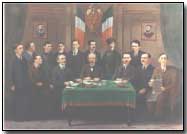Martin John Corry (12 December 1890 – 14 February 1979) was a farmer and long-serving backbench Teachta Dála (TD) for Fianna Fáil. He represented various County Cork constituencies covering his farm near Glounthaune, east of Cork city. He was a founder member of Fianna Fáil in 1926, and among its first TDs after the June 1927 general election. He was returned at every election until he stood down at the 1969 election. Corry was active in farming issues, serving as Chairman of the Beet Growers’ Association in the 1950s. In 1966, upon the resignation of Seán Lemass as Fianna Fáil leader and Taoiseach, Corry was among the Munster-based TDs who approached Jack Lynch to be a compromise candidate for the party leadership.
Corry was a senior member of the Cork No. 1 Brigade of the Irish Republican Army during the Irish War of Independence (1919–21). He took the anti-Treaty side in the Civil War (1922–23). In 2007, it was reported that Corry's farm had been the suspected site of the execution and burial place of several people considered to be pro-British agents, spies, or informers. Among these was Michael Williams, an ex-Royal Irish Constabulary officer abducted by the IRA "Irregulars" on 15 June, 1922 for his alleged role in the shooting dead in 1920 of Tomás Mac Curtain, the Sinn Féin Lord Mayor of Cork. Gerard Murphy's 2010 book The Year of Disappearances:Political Killings in Cork 1920–1923 claims Corry personally killed about 35 forcibly disappeared civilians, from a total of 73 in the Cork area of whom 26 were abducted after the June 1921 ceasefire. Murphy presents the Cork IRA's targeting of Protestants, and particular suspicion of members of the YMCA, Boy Scouts, and Methodist community, as amounting to ethnic cleansing.
Senior IRA commanders including Ernie O'Malley, Richard Mulcahy, Liam Lynch and Sean Moylan, attempted to curb the excesses of the Cork IRA, with mixed success. In later years, rumours of Corry's activities persisted, but the Military History Bureau was able to whitewash the account as its director Florrie O'Donoghue had been a comrade of Corry's.
In a Dáil career of over forty years, Corry generally restricted himself to speaking on local issues affecting his constituents. In 1953, Corry lobbied unsuccessfully for the Faber-Castell factory planned for Fermoy to be relocated further south in his territory, to the chagrin of party colleagues in Fermoy.
Corry was a staunch advocate of Irish republicanism, strongly opposed to Partition, antipathetic to the United Kingdom, and sometimes bluntly outspoken within the chamber. In 1928, he criticised the Cumann na nGaedheal government's expenditure on the diplomatic corps, stating "These salaries of £1,500 have to be paid so that they might squat like the nigger when he put on the black silk hat and the swallow-tail coat and went out and said he was an English gentleman." His opposition to the Blueshirts in the early 1930s provoked an attempt to burn down his house.
In the 1938, debate on the Anglo-Irish Trade Agreement which ceded the Treaty Ports to the Irish state, Corry expressed regret that Northern Ireland remained excluded, suggesting "I personally am in favour of storing up sufficient poison gas, so that when you get the wind in the right direction you can start at the Border and let it travel, and follow it." In a 1942, debate on exporting food to Great Britain during World War II, Corry remarked about food shortages there that "They have no more rabbits to get, and now they are on the crows", and "I would not like to see too many crows going out to feed them. I think the crows are too good for them". Patrick Giles called Corry a "bounder", and Alfred Byrne persisted in demanding an apology for the "unchristian" comments to the point of himself being suspended from the chamber.
According to Dan Keating, Corry led a group of TDs who persuaded Taoiseach Éamon de Valera to exercise clemency when Tomás Óg Mac Curtain sentenced to death in 1940 for shooting dead a Garda. Tomás Óg was an IRA member and the son of the 1920 Lord Mayor.
In 1948 and again in 1950, Corry proposed a Private Member's Bill to allow less restricted Sunday opening of public houses in rural areas, arguing the existing licensing law was widely flouted.
The bill was withdrawn after ministerial assurance of an imminent Government-sponsored licensing bill (which did not materialise) and in the face of public condemnation from members of the Catholic hierarchy.
Corry was a member of Cork County Council, representing the Cobh electoral area, from 1924 till after 1970. He often clashed with Philip Monahan, the first county manager. Corry regarded the ability of the manager, an appointed bureaucrat, to overrule the elected Council as an affront to democracy, "the tail wagging the dog", reducing councillors to being "a cloak for his dictatorship". Corry was Chairman of the Council (a position later retitled Mayor) for four years in the 1960s: 1962/3, 1964/5, 1967/8, and 1968/9. In this role in 1968 he inaugurated Cork County Hall, the tallest building in the Republic of Ireland.
Corry did not stand in the June 1969 general election. In May 1969, Tom Fitzpatrick had read a letter under Dáil privilege; allegedly written by Corry in 1955, it demanded £200 in cash from an engineering firm for securing a favourable County Council vote. It was later alleged that Corry was compelled to stand down to avoid the allegation embarrassing the party.
In November 1969, Corry was appointed a director of Comhlucht Siúicre Éireann Teoranta, the national sugar company, which was then a state-sponsored body.

No comments:
Post a Comment